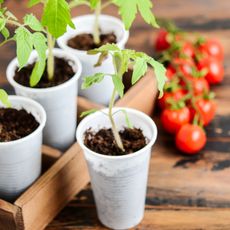Best Fruit Trees To Grow Indoors: Bring More Fruit Undercover
Knowing the best fruit trees to grow indoors can expand your potential range of fruit harvests – and add interest and color to indoor spaces. We show you how to make more of fruit trees undercover
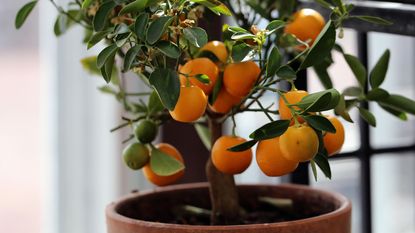
- 1. Grow Fruit Trees As Houseplants
- 2. Try Dwarf Fruit Trees
- 3. Cultivate a Potted Indoor Papaya
- 4. Grow An Indoor Lemon Tree
- 5. Try a Fruit Tree Bonsai
- 6. Try a Trovita Orange Tree
- 7. Cultivate a Guava Tree Indoors
- 8. Nurture an Indoor Olive Tree
- 9. Grow Fruit Trees in a Greenhouse
- 10. Try an Indoor Breadfruit Tree

Can you grow fruit trees indoors? The simple answer is yes, but the best fruit trees to grow indoors can present a few unique challenges. Still, that doesn’t mean this is something you should avoid fruit tree garden ideas that are best under glass. It is entirely possible to grow certain fruit trees indoors if you are careful to meet the tree’s cultural needs and position it in the best possible location. Ready to give it a try? Pick from among the easiest fruit trees to grow indoors, and let’s get started!
1. Grow Fruit Trees As Houseplants
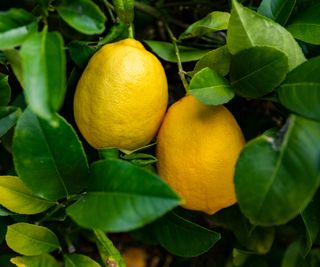
While it is more common to see fruit trees in a home orchard, growing fruit trees as houseplants sometimes works well. The most important first step is to select a type of tree that grows well inside. Most of the best fruit trees to grow indoors are dwarf varieties that won’t grow to the roof, like the Meyer lemon.
2. Try Dwarf Fruit Trees
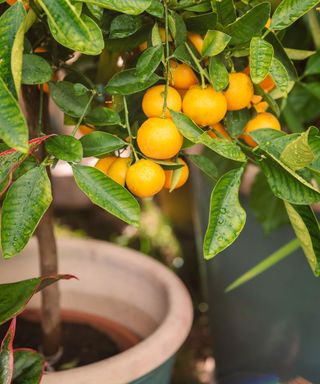
Chances are you’ll be planning on growing indoor fruit trees in containers. You’ll want to select a container size that is quite large, but not so large that it can’t be moved if and when necessary. Remember that all that soil plus the tree will make the container heavier than it is when you buy it and plan accordingly. Regular fruit trees might have a hard time thriving in pots, which makes dwarf fruit tree varieties the way to go.
3. Cultivate a Potted Indoor Papaya
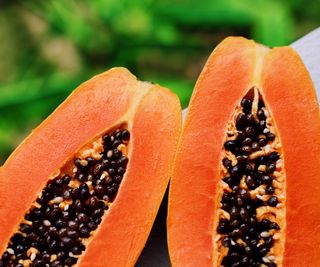
That doesn’t mean that you are limited to dwarf lemon trees. If you are wondering “What fruits can I grow indoors?” the good news is you can try growing exotic fruit indoors if you want to. One such tantalizing exotic is papaya, which can thrive in a pot as long as you can mimic tropical growing conditions, like lots of sun and very warm temperatures. You can even start one from a papaya seed.
4. Grow An Indoor Lemon Tree
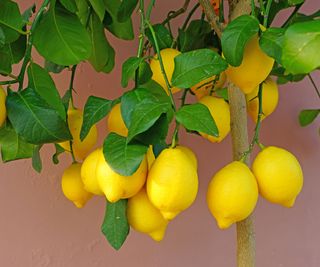
Easy fruit trees to grow indoors are undoubtedly citrus. My personal favorite tree to grow as a houseplant is a Meyer lemon. Growing an lndoor lemon tree is an excellent option, with their fragrant blossoms, dark leaves and bright yellow fruit. Those who live in cold winter climates, however, will do better bringing dwarf lemon trees indoors as houseplants. Note that lots of sun is required to get fruit.
5. Try a Fruit Tree Bonsai
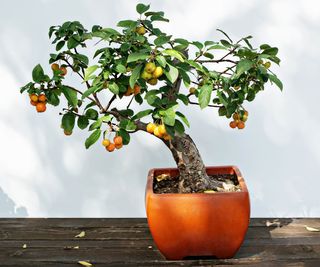
As you search for the easiest fruit trees to grow indoors, consider a bonsai tree. Aren’t bonsai just dwarf trees? No, they are not. A bonsai is a regular tree but pruned to be miniature. The tree should look like a small version of the tree, with the natural tree shape intact. Many fruit trees are available in bonsai, including crabapple, cherry trees and some types of orange. Yes, bonsai trees bear regular size fruit.
6. Try a Trovita Orange Tree
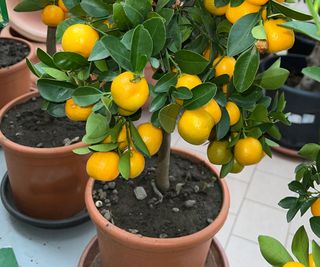
Have you ever heard of the Trovita orange tree? Maybe not, unless you live in a hot desert climate. These citrus trees get to 30ft (9m) tall outdoors, but Trovita dwarf orange trees top out at 10ft (3m), but can be kept shorter with pruning. It is a top option for anyone wishing to grow citrus houseplants, since they don’t require blazing hot temperatures to set fruit.
Gardening tips, videos, info and more delivered right to your inbox!
Sign up for the Gardening Know How newsletter today and receive a free download of our most popular eBook "How to Grow Delicious Tomatoes."
7. Cultivate a Guava Tree Indoors
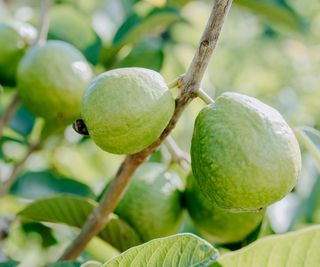
Another one of the best fruit trees to grow indoors is the Guava tree. These trees grow well outdoors in the warmest hardiness zones, but they are also good choices for indoor growing. With appropriate care, indoor guava trees flower and set fruit as well. They need good drainage, a sunny location and appropriate fertilizer to produce a crop. Even so, don’t expect fruit for four or five years.
8. Nurture an Indoor Olive Tree
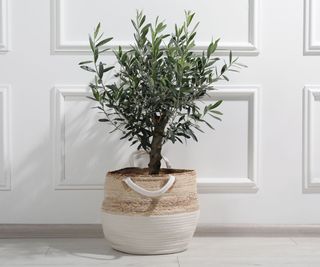
Few crop trees are more stately and majestic than the olive, so how can people be using them as houseplants, you may be wondering? There are two ways to grow olive houseplants: do a severe pruning every spring, or buy and plant a dwarf olive. Caring for olive trees inside is easy, since they tolerate dry air and dry soil as well. Plus, they are very attractive trees with narrow, gray-green leaves and summer flowers.
9. Grow Fruit Trees in a Greenhouse
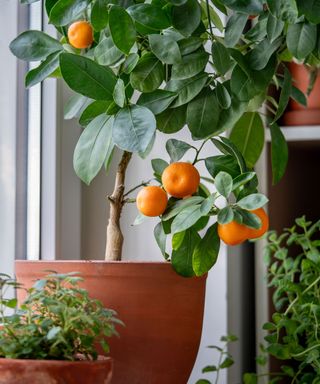
Can fruit trees grow indoors? As we’ve seen, it’s entirely possible. But it’s even easier for those who have a greenhouse. Yes, you can grow fruit trees in greenhouses, and many gardeners expand the range of their home orchard by using a greenhouse. It is easy if the greenhouse is set up for trees – that is, if the greenhouse is sufficiently tall and has a source of winter heat. Many types of warmth-loving fruit trees thrive in a greenhouse, including pears, peaches, bananas and oranges. Stay away from trees that need winter chill to fruit.
10. Try an Indoor Breadfruit Tree
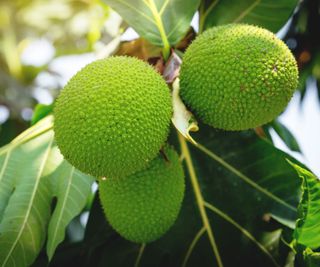
Breadfruit is one of the lesser-known fruit trees in the United States, yet it is among the highest-producing food plants on the planet. One breadfruit tree can yield 200 or more fruits per season, each one the size of a grapefruit. These are eaten like potatoes, boiled steams, baked or fried. However, while the trees make interesting houseplants, you’ll have to keep the house very warm and very humid to hope for fruit.

Teo Spengler has been gardening for 30 years. She is a docent at the San Francisco Botanical Garden. Her passion is trees, 250 of which she has planted on her land in France.
-
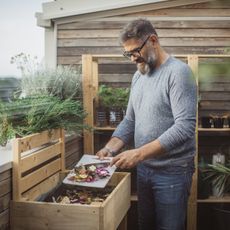 Urban Composting Guide: How To Compost In The Middle Of The City
Urban Composting Guide: How To Compost In The Middle Of The CityUrban composting does not have to be daunting. You can compost in the city, and maybe even try some urban worm composting!
By Mary Ellen Ellis
-
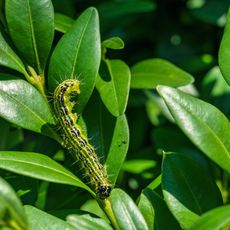 Shrub Diseases And Pests To Watch Out For
Shrub Diseases And Pests To Watch Out ForShrub diseases and pests can be challenging. Learn how to recognize and eradicate them before they can present a danger to your plants.
By Susan Albert
